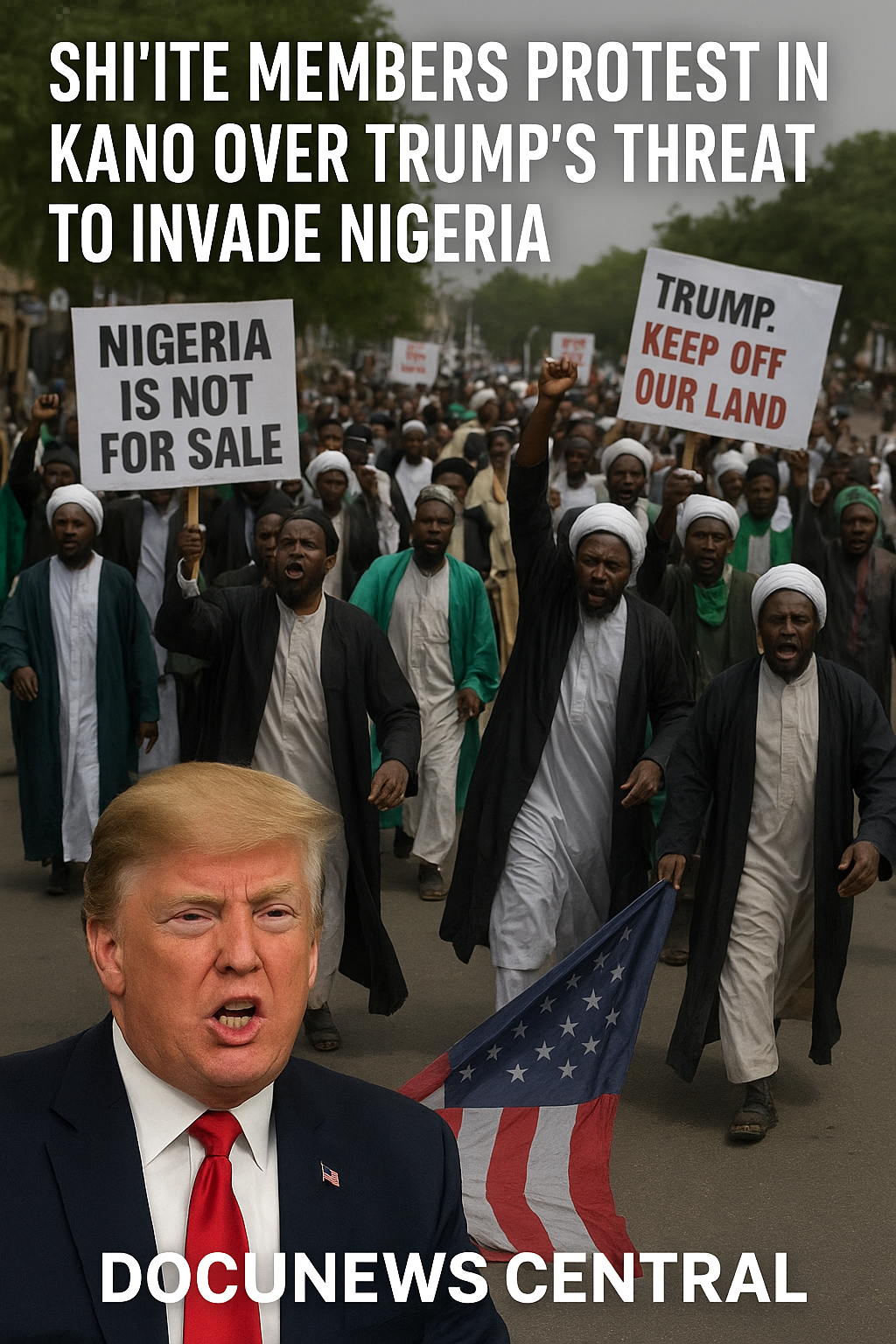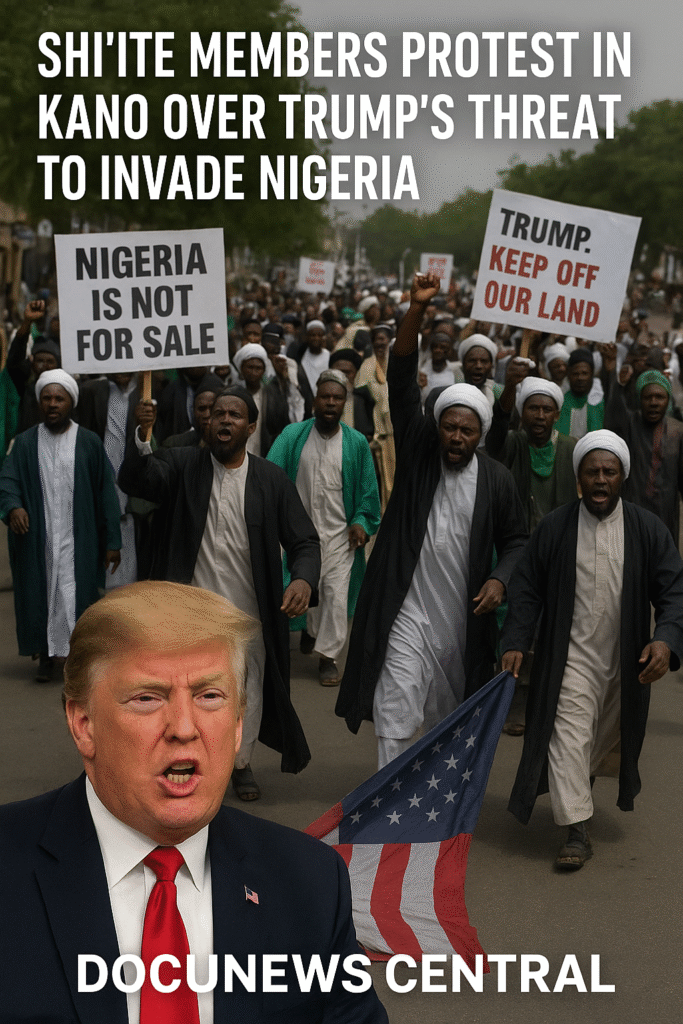

Shi’ite Members Protest in Kano Over Trump’s Threat to Invade Nigeria
Introduction
Tension gripped the ancient city of Kano on Saturday as members of the Islamic Movement in Nigeria (IMN), popularly known as the Shi’ites, took to the streets to protest against a statement allegedly made by former United States President Donald Trump, threatening military action against Nigeria. The protest, which began peacefully, soon drew massive attention as some members of the group dragged the American flag on the ground while chanting anti-US slogans.
Eyewitnesses reported that the protesters, numbering in their hundreds, marched through major streets in Kano, demanding that the Nigerian government condemn what they described as “an affront on national sovereignty.”
The Trigger — Trump’s Statement Sparks Outrage
According to several media reports, Donald Trump had issued a warning suggesting that the United States might take military action against Nigeria if certain alleged human rights violations and political instability persist. Though the U.S. State Department has yet to release an official clarification, the comment quickly went viral on social media, sparking mixed reactions across the country.
Many Nigerians described Trump’s statement as “unwarranted interference,” while others viewed it as a wake-up call for the Nigerian government to address insecurity and corruption. For the Shi’ite group, however, the statement was seen as a direct attack on Nigeria’s sovereignty and religious independence.
Protest in Kano — A Show of Defiance
The protesters were seen waving placards with inscriptions such as “Nigeria is not for sale,” “Trump, keep off our land,” and “Down with imperialism.”
As the procession moved through Zoo Road and Sabon Gari, traffic came to a standstill, forcing commuters and traders to close shops temporarily. Security operatives from the Nigeria Police Force, joined by men of the Department of State Services (DSS), monitored the demonstration to prevent it from escalating into violence.
“We came out today to show that Nigeria cannot be intimidated. No foreign power has the right to dictate how we run our affairs. Dragging the American flag is not an act of violence; it is a message of resistance,” said Ibrahim Musa, one of the protesters, to DocuNews Central.
Government Reaction and Security Response
The Kano State Police Command confirmed that it was aware of the protest but assured residents that the situation was under control. Speaking to journalists, the Police Public Relations Officer (PPRO), SP Abdullahi Haruna, said:
“Our men are on ground to ensure law and order. We respect the right of citizens to peaceful protest, but we will not tolerate any form of violence or attack on public property.”
The Federal Government has yet to issue an official response to the protest, but sources in Abuja told DocuNews Central that the Ministry of Foreign Affairs is “monitoring the situation closely.”
Shi’ite Movement and Its History of Protests
The Islamic Movement in Nigeria (IMN), led by Sheikh Ibrahim El-Zakzaky, has long been known for organizing protests to demand justice, religious freedom, and the release of its detained members.
In past years, the movement has clashed with security forces, especially during demonstrations calling for the release of El-Zakzaky and his wife. Saturday’s protest in Kano adds to the long list of IMN’s public demonstrations, but this time, it is directed not at the Nigerian government, but against a foreign power.
Public Reactions Across Nigeria
The protest in Kano has sparked widespread debate across Nigeria. On social media, opinions remain divided.
While some Nigerians commended the Shi’ite members for “defending national pride,” others criticized them for allegedly desecrating the U.S. flag — a move they believe could strain Nigeria’s diplomatic relations with the United States.
“For years, Nigeria has relied on Western nations for military and economic support. But when such nations make statements perceived as threats, groups like the IMN take it personally,” said Dr. Yusuf Bala, a social commentator.
Experts Weigh In on the Diplomatic Implications
Foreign policy analysts have urged caution, warning that protests targeting foreign nations could have broader diplomatic implications.
Professor Charles Eze, an international relations expert at the University of Lagos, told DocuNews Central that such incidents, if not managed properly, might affect Nigeria’s image abroad.
“Dragging or burning the American flag may appear symbolic locally, but internationally, it sends a negative message. The Nigerian government must balance domestic freedom of expression with diplomatic sensitivity,” he said.
Religious and Political Undertones
The Shi’ite movement’s involvement adds a unique religious dimension to the political controversy. Historically, IMN members have accused both the Nigerian government and Western powers of persecuting Muslims and promoting policies that undermine Islamic values.
Their decision to protest Trump’s statement fits into a broader narrative of resisting Western dominance and defending religious autonomy.
Voices from the Streets
Residents of Kano expressed mixed feelings about the protest. While some supported the Shi’ite members’ right to express themselves, others worried that it could lead to confrontation with security forces.
“When I saw people dragging the U.S. flag and chanting, I got scared. We’ve seen protests turn violent before, so I didn’t want to take chances,” said Fatima Abdullahi, a trader in Sabon Gari.
“They spoke for all Nigerians who are tired of being looked down upon by the West. Trump’s words were disrespectful. Nigeria is not a colony,” said Musa Garba, another resident.
The Broader Context — US-Nigeria Relations
The United States and Nigeria have enjoyed decades of diplomatic and economic relations. The U.S. remains a major trading partner and provides support in counterterrorism operations, health programs, and education.
However, relations have occasionally been strained by allegations of human rights abuses by Nigerian security forces. Trump’s alleged remarks, whether misinterpreted or not, have once again highlighted the fragile balance between partnership and sovereignty.
Calls for Calm and Diplomacy
Civil society organizations and human rights advocates have called for calm on both sides. The Centre for Democratic Dialogue (CDD) released a statement urging Nigerian authorities and the U.S. government to handle the situation diplomatically.
“Nigeria must not allow external political statements to create internal unrest. Protests should remain peaceful, and both nations should reaffirm their commitment to mutual respect and cooperation,” the statement read.
The CDD also advised media houses to verify statements attributed to global leaders before dissemination to prevent misinformation and public panic.
Conclusion
The Shi’ite protest in Kano serves as a reminder of how quickly global political rhetoric can ignite local reactions. While freedom of expression remains a fundamental right, it must be exercised responsibly to prevent escalation.
As Nigerians await official clarification from both Washington and Abuja, one thing is clear — the people are watching, and national pride runs deep.
Whether Trump’s alleged threat turns out to be exaggerated or factual, the protest underscores the sensitivity of Nigerians to issues of sovereignty and external interference. The world watches as Kano once again becomes the focal point of political expression in Nigeria’s democratic journey.






